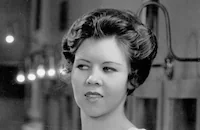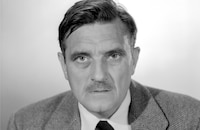When Gangland Strikes
Cast & Crew
R. G. Springsteen
Raymond Greenleaf
Marjie Millar
John Hudson
Anthony Caruso
Marian Carr
Film Details
Technical Specs

Synopsis
Gangster Duke Martella, accompanied by his lawyer, Leo Fansler, goes to pick up his girl friend, Hazel Worley, upon her release after serving a one-year prison sentence. Martella is accused of killing a key witness in the district attorney's murder case against him and worries about his upcoming trial. On the ride to town, Hazel explains that she promised her recently deceased cellmate that she would deliver a letter to a man named Luke Ellis, who lives in the sleepy town of Lawndale. In Lawndale, meanwhile, Luke, the county prosecutor who believes "in squeezing human understanding into the law," reluctantly cross-examines Jerry Ames, a young Korean War veteran who has been accused of stealing $27.50 from his employer, Walter Pritchard, the owner of the local hardware store. When Luke argues that Jerry only borrowed the money to buy his wife an anniversary present, the jury finds him innocent and the courtroom erupts in applause, much to the chagrin of Pritchard, who believes that Luke is far too lenient to be a prosecutor. After the trial is adjourned, attorney Bob Keeler, Pritchard's nephew, who is engaged to Luke's daughter June, warns Luke that his uncle has told him to draw up a petition recalling him from office. Luke then confides to Bob that he prefers leniency to punishment because, as a young man, he sent a woman to prison for life and has regretted it ever since. Upon reaching Lawndale, Martella asks Slim Pickett, Luke's fishing buddy, where he can find Luke Ellis. When Slim states that Luke is the county prosecutor, Fansler asks to see the letter, and after reading it, decides to ask for a change of venue for Martella's trial. At Fansler's behest, Martella's trial is moved to Lawndale. Soon after, prosecutor Mark Spurlock delivers his file on the case to Luke. Wondering why Fansler requested the change of venue, Spurlock counsels Luke that he needs to challenge the witnesses who are providing Martella with an alibi at the time of the murder. On opening day of the trial, Martella barges into Luke's office and hands him the letter. In it, the woman Luke sent to prison thanks him for raising the baby daughter she bore in prison as his own child. Martella then threatens to expose June's parentage unless Luke "throws the trial." As the trial begins, Luke moves to quash the first count against Martella, then sabotages the state's case by failing to debunk the alibi witness' testimony. At the close of the trial, the judge instructs the jury that the prosecutor has failed to provide enough evidence of guilt and dismisses the case. Outraged by Luke's ineptitude, the townsfolk unanimously endorse the recall petition. When Bob decides to run for the prosecutor's office, June, feeling that Bob has betrayed her father, breaks their engagement and tells Pritchard that "he ought to be shot." After Bob wins the election, he decides to reopen the quashed charge in the Martella case. Luke then admits that he threw the case and shows Bob the letter. Assuring Luke that June will understand, Bob urges him to tell her the truth. As Bob announces that he is reopening the Martella case, Luke gingerly tells June that he sent a pregnant woman to jail, then reveals that the woman was her mother. When Luke discloses that Bob urged him to tell her the truth, June realizes that she misjudged Bob. Learning that Bob is headed to Pritchard's office, June is about to hurry there when Slim offers her a ride. At Pritchard's office, meanwhile, Martella tries to bribe Pritchard to convince his nephew to cancel the trial. When Pritchard refuses, Martella shows him a Photostat of the letter and threatens blackmail. Infuriated, Pritchard picks up the phone to notify the police, prompting Martella to attack him. A fight ensues, and when Slim pulls up to the office with June, they see the shadows of two men struggling in Pritchard's office. As June runs up the stairs, Martella shoots Pritchard, then hides behind the door when June enters. Martella then charges down the stairs and speeds off in his car. Based on circumstantial evidence, Sheriff McBride books June for Pritchard's murder. Hard-boiled attorney Dixon Brackett is called in to prosecute while Luke defends June. At the trial, Dixon contends that June's motive was vengeance, then calls the town barber to testify that he heard her say Pritchard should be shot. Dixon then discredits Slim's testimony that he saw two men fighting in Pritchard's office by pointing out that Slim had earlier reported seeing flying saucers. Certain that Martella murdered Pritchard, Luke determines to obtain a bullet from the gangster's gun. Luke then subpoenas Martella to testify, and after debunking his alibi that he was at a piano recital at the time of the murder, asks to have Martella's driver Chip placed in protective custody. Luke then produces a deposition, purportedly given by Chip, which will prove that Martella killed Pritchard. As Martella pulls out his gun and aims at Chip, Slim grabs the weapon, sending the bullet into the ceiling. Luke then reveals that a homily, not a deposition, was written on the piece of paper. After a ballistics test confirms that the bullet came from the gun that killed Pritchard, June is exonerated, after which Bob presents her with a diamond engagement ring.

Director
R. G. Springsteen
Cast
Raymond Greenleaf
Marjie Millar
John Hudson

Anthony Caruso
Marian Carr

Slim Pickens

Mary Treen
Ralph Dumke

Morris Ankrum
Robert Emmett Keane

Addison Richards

John Gallaudet
Paul Birch
Richard Deacon
Rankin Mansfield
Frank Kreig

James Best
Fred Sherman

Nancy Kilgas
Dick Elliott
Norman Leavitt

Peter Mamakos
Scott Douglas
Pauline Drake
Jim Hayward
Crew
Van Alexander
John K. Butler
Frederic Louis Fox
Walter Keller
Howard Lydecker
Theodore Lydecker
Bob Mark
Tony Martinelli
John Mccarthy Jr.
George Milo
William J. O'sullivan
Adele Palmer
John L. Russell Jr.
Dick Tyler Sr.
Dolph Zimmer

Film Details
Technical Specs

Quotes
Trivia
Notes
The working title of this flm was A Shot in the Dark. A sequence in which "Duke Martella" is shown shooting a man in a bowling alley precedes the film's title card. The plot of When Gangland Strikes closely resembles that of Republic's 1939 film Main Street Lawyer (see AFI Catalog of Feature Films, 1931-40), although the writers of the two films are not the same.












